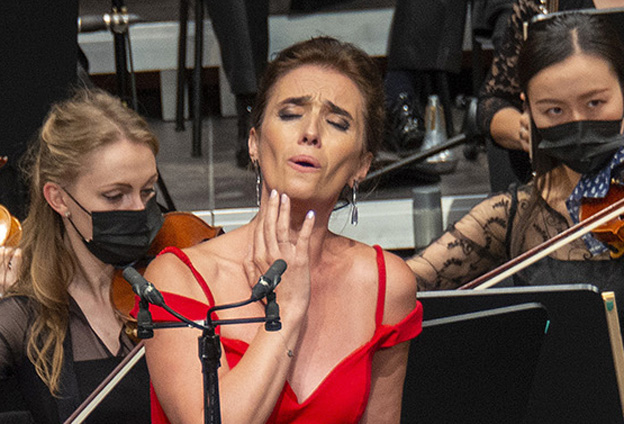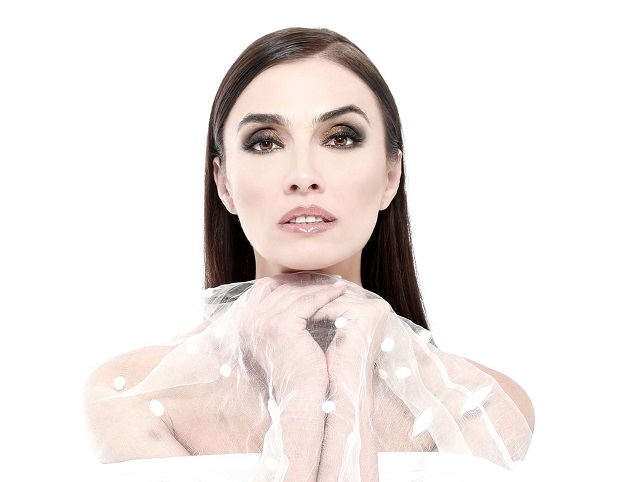Ermonela Jaho, I would like to briefly go over some of the most important moments of your professional life. I read somewhere that as a child you wanted to be a pop singer. Is that true?
Yes, it is true. When you’re a child that is the music that impacts you the most and you want to become famous immediately, those dreams start that way, as a game. So it started like that but after that I realized my soul belonged to classical music.
It was a production with La Traviata you saw in Tirana that changed your perspective and reframed your entire life, actually. What impressed the young girl that you were at the time, in this Verdian masterpiece?
It’s interesting that you’re asking me this now, because I was wondering the same thing very recently, after my last performance of La Traviata at the Metropolitan in New York. I went back to that moment, when I was so young and I saw my first opera. I was 14 years old. I started singing when I was 9 years old, wanting to become a pop star, but after I turned 13, I wanted to study music at a professional level, I wanted to study canto. I went and gave an audition for the Arts High school in Tirana, where I studied from then on. Since I wanted to observe the way of singing classical music, I went to our Opera House (the only one we have in Albania) and the show was La Traviata¸(sung in Albanian) and I just fell in love, it was magical!
I cannot explain it in words; everything moved me – the overture, the story, the drama, the tragedy. It was something that connected immediately with me and after the evening was over I promised myself and my brother (who was with me): now I know I want to become an opera singer and I don’t want to die without singing this part at least once in my life. And last week it was my Traviata no. 306! I was so proud (and I say that with humbleness) that I made my dream come true. I wanted this so desperately! It was really hard work on my part, but I think the universe also helped me to accomplish my dream! So this is how it started.
This was the first stage of your musical education. Afterwards, in 1994, you went to Italy, to study at the Accademia Nazionale di Santa Cecilia in Rome. Who were your mentors at this point?
In 1993 I won a singing competition, and for the first time in a long while, Albania was open to the world, so Katia Ricciarelli came to Albania and she picked five opera singers (students and professionals) for a master-class in Mantua. After this experience I wanted to stay in Italy, because I saw the first light on the road of realizing my dream. After that, in Santa Cecilia, it was Valerio Patteri, but I also worked with Paolo Montarsolo, a great Italian basso buffo. I still have a vocal teacher, in New York, because we remain students forever.
Even if you are already successful it is always a good idea to continue studying, to clean up things a little bit, technically speaking, because on stage emotions can take over.
You were born in Albania, you then studied and lived in Italy, and for some years now New York is your home. Which means you went from a (former) communist country to a free European one and then you crossed the Atlantic to the United States of America. How did you perceive the musical world in these three very different environments and moments in time, because times have changed?
Being so isolated, in communism, when I was in Albania, I kept everything inside. Everyone around me kept their opinions to themselves, they didn’t express much, out of fear. So music was my way of channeling what I felt inside and it helped me build a tortured soul, it made me more vulnerable and that helps when you’re an artist. When you see a lot of suffering you can then give the audience a more lush experience of that, because you lived it. I always that in order to be a real artist you must have a tortured soul. And plus – I had a big dream, which seemed impossible! I prayed that someday I would sing at La Scala and other major opera houses around the world. And then, winning the competition, being selected by Katia Ricciarelli and going to Italy was the first step forward towards my dream.
When I left my country I was 18 years old and I missed my country I missed my family, we were really close. But I went! With a big dream and empty pockets. I worked really hard and I was on the verge of depression, but my passion was enormous, I was desperate to make it happen! Maybe also because in music I found my freedom! There were moments when I wanted to give up, go back home, moments when I thought it was just too difficult, but then the other thought that I had told me that if the dream is so big, then maybe the suffering has to be big as well. So I told myself that maybe I had to suffer to make it happen. There is always a price to pay. I went to competitions, which also helped me with money, and then I met my first management, and because of the competitions I had won I got the possibility to make my debut, then I met my second management. So concerning these three worlds, I remember when I was a young girl I kept asking myself why I wasn’t born in one of these countries with more economical possibilities? But now I understand that what back then was my weakest card now is my strongest card, because my life experience, the suffering and the sacrifices gave me the meaning of life and connected me with the characters that I was singing. It’s not only the voice, because there are a lot of very beautiful voices appearing every year. In my case it was my life experience that gave to my voice the needed color and made me the artist that I am today. I believe in everything – when I cry I really am crying, when I suffer for sure, because I go back to my past and to this hard journey I took.
You really connect with the audience and your performances are always very intense, both from a vocal and from an acting point of view. How do you manage to keep that necessary distance that allows you to sing, to act, that distance that allows every genuine artist to make it till the end of the performance without losing him/herself in the raw emotions?
Before it was half and half – 50% control and 50% just going with the flow. Now, after almost 30 years of this professional career, to be honest with you, I go on stage with the thought in my mind of just letting the performance be a beautiful one. It has to be a spiritual journey. So really I just let it go! Since I did my first Suor Angelica, which was a very personal experience, I go on stage every time like it would be my last time. Of course I have to do my homework, technically speaking, every single day. You need that kind of preparation; because we can talk about emotion, about letting go, but it is necessary to have that technical control that allows you to do that. The stronger the technique, the more freedom you’ll have to express yourself. I actually cry on stage right now, I cannot control this anymore. Of course there is control there, because you have to breathe, you have to finish the opera. It’s more real and it brings me another dimension, in which I am not just the performer, I push myself to the edge, it’s a kind of ecstasy, almost becoming the same person with the character that I’m singing. This is sometimes really hard and it becomes addictive, because it’s magic. Suddenly you don’t have any more difficulties with the high notes, with the technique, because you become one with the character in this spiritual journey. And with each character I discover myself as well and I go deeper and deeper. On stage I feel so lucky because I can let it go, it’s the best therapy. On stage I accept myself with my strongest and my weakest points. I don’t think anymore about whether the public will like my performance or not, or about that legato, or that phrase, or that forte. No! In that moment I think that every forte, every pianissimo represents the colors of the soul that I’m singing. Now I’m rehearsing Adriana Lecouvreur in Sydney and I cry even in rehearsal. I think I am more Adriana than Mimì. I’m very happy to sing this repertoire now – this is my third production with Adriana – and it’s so moving because you can observe how vulnerable the artists are. During the pandemic we saw that; to be on stage, to be applauded by the public in every part of the world and suddenly the opera houses were closed. That’s when we realized how delicate this profession is. So now I’m enjoying every moment, even during the rehearsals. I’ve come to think that maybe today is going to be my last time singing opera on stage. You never know how long you are going to be able to do that.
Could we come back to Suor Angelica a bit, please, so you can share with us that extraordinary emotional artistic experience from your point of view?
I told you it was something very personal that changed my perspective as an artist. Because in that period I lost both my parents and strangely I felt numb, I couldn’t cry. I think in every stage of our lives we are not ready to lose our parents, who are the core of our lives. So in that moment the Royal Opera House in London contacted me, because the artist who was supposed to sing Suor Angelica left the productions and the premiere was 8, 9 days away. They asked me if I could jump in. It was destiny, because I didn’t have time to think whether I was ready or not. I told them I don’t know the opera, I never sang it in my life. But I took the challenge, to do it in just one week. I learned the opera, I went to rehearsals and I didn’t say one word in London about my recent loss, because I didn’t want people to know that, had to suffer for my loss, so I didn’t want to share that, I didn’t want them to feel pity for me. So I kept on rehearsing and when I went on stage – I’ll never forget that! – something magical happened. At the moment were La Zia Principessa is saying to Angelica: your son is dead – it was the first time I cried for my parents. I cried like a little girl and I couldn’t stop. Pappano was watching me and wondering if I was acting or being real, since no one knew about my losses. And in that moment I continued to sing Angelica, but not like the young mother who lost her child, but as Ermonela, the little child who had lost her parents. I was the opposite, but the pain was the same and so real. For the first time I didn’t think about the voice, about the notes, I just needed to survive, because I had the public in front of me. That’s why music is magic when you let it go, because my pain was so strong and so real and I didn’t have time to behave like a singer. I needed to survive in front of everyone, with that pain. I sang, but the emotion was so real and so strong, and in the end, to make it short, it was a success, but I was actually mourning my parents on stage, that night. I didn’t sleep that night, and the next day I came back to reality, little by little. When I read the articles everyone was talking about the emotion, everyone was talking so beautifully about the performance. So I thought to myself: don’t be afraid to show your emotion. The public needs truth, and the truth is not always beautiful. And this changed my life and it changed my career. From that moment on I decided not to expect anything anymore, but to be true to myself and to the public.
How do you recover from your performances, which must be very taxing emotionally for you? Do you suffer from insomnia, being so charged with adrenaline even after the evening has ended?
I do have insomnia, I sometimes don’t sleep the entire night, even if I take something to help with that. Sometimes the adrenaline is so high that no pill works. So what I do is talk with my husband, who is my best friend, we grew up together in Albania. But of course you cannot talk the whole night. And after that…It’s hard because you have to go back to reality.
Most of the times I can’t sleep that night, there’s too much adrenaline in my body, and sometimes I am so exhausted that I can’t stay on my feet anymore. Even though I’m not that young anymore, I think I can recover better now, since I don’t have that many expectations; the only expectations I have are from myself. It helps me more to say “I’ve done my best tonight. Could it have been better? Of course! Because that aspiration to perfection always exists. But at least tonight I gave my best.” When you appear in front of thousands of people of course you are going to be judged, so this type of thinking, giving your best every time, helps you.
Talking about recovery and self-protection, I feel the need to ask you if the opera business (because it’s not just the art we are referring to) made you develop a more cynical part of yourself? Do you ever feel the need to protect yourself?
Of course! It can get harsh. Also this business, this world, has changed so much over the years. That’s why I have no expectations anymore, that’s why I always sing like it’s my last day on stage. I think it’s my duty to do that. And yes, times change, it is really difficult to make it, but if you fight hard nothing is impossible. Whenever I give masterclasses (in Albania or in other countries) I always say that and I share my experience. I want to help the new generation, to give it hope. One of our fights is to keep the art and the soul alive, in a world that has become quite superficial. And I think we can keep it alive with our so-called “weakness”, with our vulnerability. Unfortunately I see the young generation being afraid to show their vulnerability, because they think if they expose their weakest spot someone is going to take advantage of that. But the artist is a tortured soul, and only a tortured soul can bring that humanity we long for. Classical music is magic, is a spiritual journey. Of course all this needs to have hard work and strong technique as a base.

Ermonela Jaho at the ICMA Gala in Vaduz, 2021, where she received an Award for her album Anima Rara (c) Alfred Mennel
You are one of the favorite singers of classical music worldwide, and recently you were named Artist of the year 2023 by ICMA. What were you singing when you received the news and how did you feel about the award?
I was at the Met, singing Traviata, and when I read the news I was so moved that I cried. I didn’t expect it. Tears of joy, because I thought that I did something good. For me that means that the public can read my own soul, it means that with my limits and my possibilities I manage to reach the people. I was very happy and honestly I wanted to hug myself, because I am harsh on myself. I had to be, especially in my younger days, coming from Albania I felt I needed to fight three times more than others. To have this recognition…I just wanted to hug myself and congratulate the young Ermonela, too. I wanted to tell her: “Look, you’ve done something good!” It was very emotional for me, it made me go back, to have a look at my entire life. There are so many other great artists, singers, around the world, so to receive this award made me very privileged and happy.
Congratulations! It seems like young Ermonela managed to fulfill all of her dreams! What is the adult Ermonela dreaming about today?
I know it might seem strange, but I don’t have dreams anymore. I feel so lucky I made it this far, that I made it happen! Of course I had help from all the people that I met, from competitions, hard work, even from the mistakes I made, from experience, from everything. Now I would like to just enjoy all of this a little bit more. I want to be a bit nicer to myself, to love myself a little bit more. Also I would like to share my experience with the younger generation.























